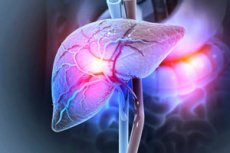New publications
Role of hUC-MSC in the management of acute liver failure: mechanistic evidence
Last reviewed: 02.07.2025

All iLive content is medically reviewed or fact checked to ensure as much factual accuracy as possible.
We have strict sourcing guidelines and only link to reputable media sites, academic research institutions and, whenever possible, medically peer reviewed studies. Note that the numbers in parentheses ([1], [2], etc.) are clickable links to these studies.
If you feel that any of our content is inaccurate, out-of-date, or otherwise questionable, please select it and press Ctrl + Enter.

Acute liver failure (ALF) is a life-threatening clinical problem with limited treatment options. Human umbilical cord blood-derived mesenchymal stem cells (hUC-MSCs) may be a promising approach for the treatment of ALF. This study aims to investigate the role of hUC-MSCs in the treatment of ALF and the underlying mechanisms.
A model of ARF in mice was induced by administration of lipopolysaccharide and d-galactosamine. Therapeutic effects of hUC-MSCs were assessed by analyzing the activity of serum enzymes, histological condition and cell apoptosis in liver tissues. The level of apoptosis was analyzed in AML12 cells. The levels of inflammatory cytokines and the phenotype of RAW264.7 cells co-cultured with hUC-MSCs were determined. The C-Jun N-terminal domain kinase/nuclear factor kappa B signaling pathway was studied.
HUC-MSCs treatment decreased serum alanine aminotransferase and aspartate aminotransferase levels, reduced pathological damage, attenuated hepatocyte apoptosis and decreased mortality in vivo. Co-culture with hUC-MSCs decreased the level of AML12 cell apoptosis in vitro. Moreover, lipopolysaccharide-stimulated RAW264.7 cells exhibited elevated levels of tumor necrosis factor-α, interleukin-6 and interleukin-1β and a higher number of CD86-positive cells, whereas co-culture with hUC-MSCs decreased the levels of these three inflammatory cytokines and increased the proportion of CD206-positive cells. Treatment with hUC-MSCs inhibited the activation of phosphorylated (p)-kinase C-Jun N-terminal domain and p-nuclear factor kappa-B not only in liver tissues but also in AML12 and RAW264.7 cells co-cultured with hUC-MSCs.
In conclusion, hUC-MSCs can alleviate AKI by inhibiting hepatocyte apoptosis and regulating macrophage polarization, and thus hUC-MSCs-based cell therapy may serve as an alternative option for patients with liver failure.
The results are published in the Journal of Clinical and Translational Hepatology.
